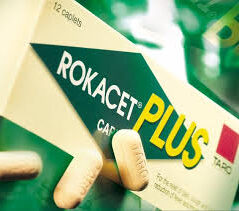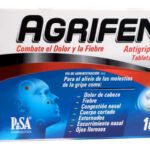Rokacet: Uses, Ingredients, Dosage, Side Effects, Abuse

Rokacet is an Isreali brand of pain medication produced by Taro Pharmaceuticals. It contains the following active ingredients: Caffeine, Codeine and Acetaminophen (Paracetamol).
Rokacet Strength: Paracetamol 500mg, Caffeine 30mg, Codeine phosphate 10mg
Rokacet Plus Strength: Paracetamol 500mg, Caffeine 50mg, Codeine phosphate 15mg
Paracetamol: a common pain killer seems to work by blocking chemical messengers in the brain that tell us we have pain. Paracetamol also reduces fever by affecting the chemical messengers in an area of the brain that regulates body temperature.
Caffeine: is a type of drug called “stimulants.” Caffeine acts as an adenosine receptor antagonist. Caffeine could reduce pain sensation through its effects on adenosine receptors. Caffeine seems to express its direct effect via central blocking of adenosine receptors that influence pain signaling or by blocking of peripheral adenosine receptors on sensory afferents.
Codeine: belongs to a class of medications called opiate (narcotic) analgesics and to a class of medications called antitussives. When codeine is used to treat pain, it works by changing the way the brain and nervous system respond to pain.
What is Rokacet tablet used for?
Rokacet tablet is used in the management of the following conditions:
- Headache
- Migraine
- Toothache
- Backache
- Rheumatic pain
- Dysmenorrhea (period pain)
- Dental pain
- Strains and sprains and sciatica.
How to use Rokacet tablet
Take Rokacet exactly as directed on the prescription or package label. Do not take more Rokacet or take it more often than directed, even if you still have fever or pain. Ask your doctor or pharmacist if you do not know how much medication to take or how often to take your medication. Call your doctor if you still have pain or fever after taking your medication as directed.
Check nonprescription cough and cold product labels carefully before using two or more products at the same time. These products may contain the same active ingredient(s) as Rokacet tablet and taking them together could cause you to receive an overdose.
Is Rokacet Tablet addictive?
Yes, Rokacet tablet contains a highly addictive ingredient (codeine). When codeine containing medications like Rokacet tablets are used for a long time, it may become habit-forming, causing mental or physical dependence. However, people who have continuing pain should not let the fear of dependence keep them from using narcotics to relieve their pain. Mental dependence (addiction) is not likely to occur when narcotics are used for this purpose.
Physical dependence may lead to withdrawal side effects if treatment is stopped suddenly. However, severe withdrawal side effects can usually be prevented by gradually reducing the dose over a period of time before treatment is stopped completely. Keep the medication in a place where others cannot get to it. Selling or giving away this medicine is against the law.
What are the side effects of Rokacet tablet?
Rokacet tablet can cause several side effects. Consult your doctor if you observe any of the following side-effects, especially if they do not go away.
• Dizziness
• Drowsiness
• Vasoconstriction
• Bone loss in postmenopausal women
• Anxiety disorders
• Lightheadedness
• Sedation
• Shortness of breath
• Nausea
• Vomiting
• Sweating
• Constipation
• Allergic reactions
• Euphoria
• Dysphoria
• Abdominal pain
• Pruritis
• Faintness
• Flushing
• Hypotension
• Palpitations
• Syncope
• Abdominal cramps
• Anorexia
• Diarrhea
• Dry mouth
• Gastrointestinal distress
• Pancreatitis
• Anxiety
• Fatigue
• Headache
• Insomnia
• Nervousness
• Shakiness
• Somnolence
• Vertigo
• Visual disturbances
• Weakness
• Rash
• Respiratory depression
• Circulatory depression
• Respiratory arrest
• Shock
• Cardiac arrest
• Abnormal skin sensations
• Feeling of sickness
• Skin reddening
• Swollen facial features
• Liver damage
• Abnormalities of blood cells
• Rashes
• Liver toxicity
• Less white blood cells
• Acute renal tubular necrosis
• Blood dyscrasias
• Rokacet Tablet may also cause side-effects not listed here.
If you notice other side-effects not listed above, contact your doctor for medical advice. You may also report side-effects to your local food and drug administration authority.
Rokacet tablet Safety Information
In deciding to use a medicine, the risks of taking the medicine must be weighed against the good it will do. This is a decision you and your doctor will make. For this medicine, the following should be considered:
Allergies
Tell your doctor if you have ever had any unusual or allergic reaction to this medicine or any other medicines. Also tell your health care professional if you have any other types of allergies, such as to foods, dyes, preservatives, or animals. For non-prescription products, read the label or package ingredients carefully.
Pediatric
Appropriate studies have not been performed on the relationship of age to the effects of Paracetamol and codeine combination oral suspension in children younger than 3 years of age. Safety and efficacy have not been established. Use of Paracetamol and codeine combination oral solution or tablets is not recommended in children younger than 12 years of age. Safety and efficacy have not been established.
Paracetamol and codeine combination should not be used to relieve pain after surgery to remove tonsils or adenoids in any children. Severe breathing problems and deaths have been reported in some children who received codeine after tonsil or adenoid surgery.
Geriatric
Appropriate studies performed to date have not demonstrated geriatric-specific problems that would limit the usefulness of Paracetamol and codeine combination in the elderly. However, elderly patients are more likely to have age-related liver, kidney, heart, or lung problems, which may require caution and an adjustment in the dose for patients receiving Paracetamol and codeine combination.
Breastfeeding
Studies in women breastfeeding have demonstrated harmful infant effects. An alternative to this medication should be prescribed or you should stop breastfeeding while using this medicine.
Drug Interactions
Although certain medicines should not be used together at all, in other cases two different medicines may be used together even if an interaction might occur. In these cases, your doctor may want to change the dose, or other precautions may be necessary. When you are taking this medicine, it is especially important that your healthcare professional know if you are taking any medicine that can interact with this medication.





